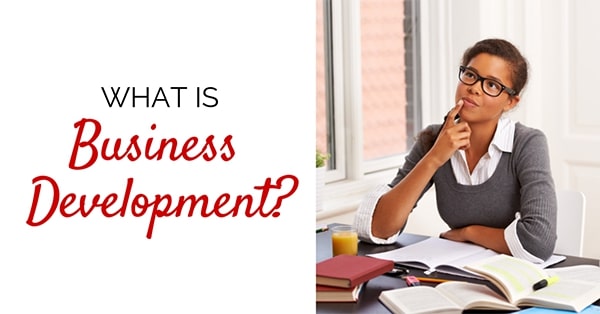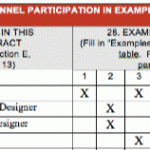
People reading the Business Development Manager Job Description might ask themselves, “What is business development, exactly?” or “what is business development’s role?” or “Why is business development so important?”
Therefore, I’ll try to make it clear and straightforward.
Business development is a commonly-used term for businesses that provide services. Businesses that sell products often use the term, “sales.”
The Difference Between Business Development and Sales
When selling services, you are often selling the knowledge and capabilities of the people in your company. Therefore, a business developer doesn’t have a tangible product. Instead, he or she is tasked with selling people’s time or the result of people’s time.
Very often, a client will not order the company’s service until they have met with the people who will provide this service. As a result, the business developer must also present the internal team to the potential client (usually in the form of a meeting, proposal, and/or presentation).
The responsibilities of a business developer are often broader than that of a salesperson. They could include activities such as research, strategic planning, or even training.
The business developer is often brought on to complement the seller-doer model, where the people who do the work are also tasked with bringing in new clients. Business developers help seller-doers increase their sales by providing the strategic approach these people sometimes lack.
The Similarities Between Business Development and Sales
Both business developers and salespeople are expected to identify potential clients, approach them, and participate in the closing of deals. They are both responsible for meeting sales targets and growing the firm (or company).
Two nuances distinguish the different roles. If you are a salesperson selling pencils (product), you’ll bring those pencils to the prospective client. That client may look at the pencils. Heck, he or she may even write with one of them. But they will not speak with any of the pencils.
But if you are a business developer selling services (let’s say architecture services), you’ll bring an architect to your prospective client. Unlike the pencil, the architect talks. The architect will ultimately play a role in closing that deal.
The other nuance relates to strategy. You send your salesperson off to go sell pencils. Your salespeople are your foot soldiers.
But business developers are often tasked with pursuing strategic opportunities. Business development activities could include things like by cultivating partnerships, tracking trends, or identifying new markets.
That doesn’t mean business developers don’t go out and “pound the pavement.” Most often, they do. But there is more to business development than that.
What Is Business Development Strategy?
It might be hard to distinguish between a business development strategy and a marketing strategy.
The line between marketing and sales is pretty clear in the world of products. But in the world of services, the line between marketing and business development isn’t as clear.
In a service business, your business development department and your marketing department might even be a single entity.
To learn about specific business development strategies see: Business Development Strategy: The 8 Strategies You Need To Know
What Skills Are Required For Business Development?
Now that we understand what business development is and how it differs from sales, what are the skills a business developer needs and how do those differ from a salesperson?
Ultimately, you want whoever is leading this effort to be able to come up with useful business development ideas and see them through to execution.
Critical thinking and the ability to see a plan through to completion are probably your two most essential skillsets. Another critical skill is the ability to spot trends or situations your business can capitalize on.
For a full description of the skills you might want in a business developer, see my Business Development Manager Job Description.





Speak Your Mind